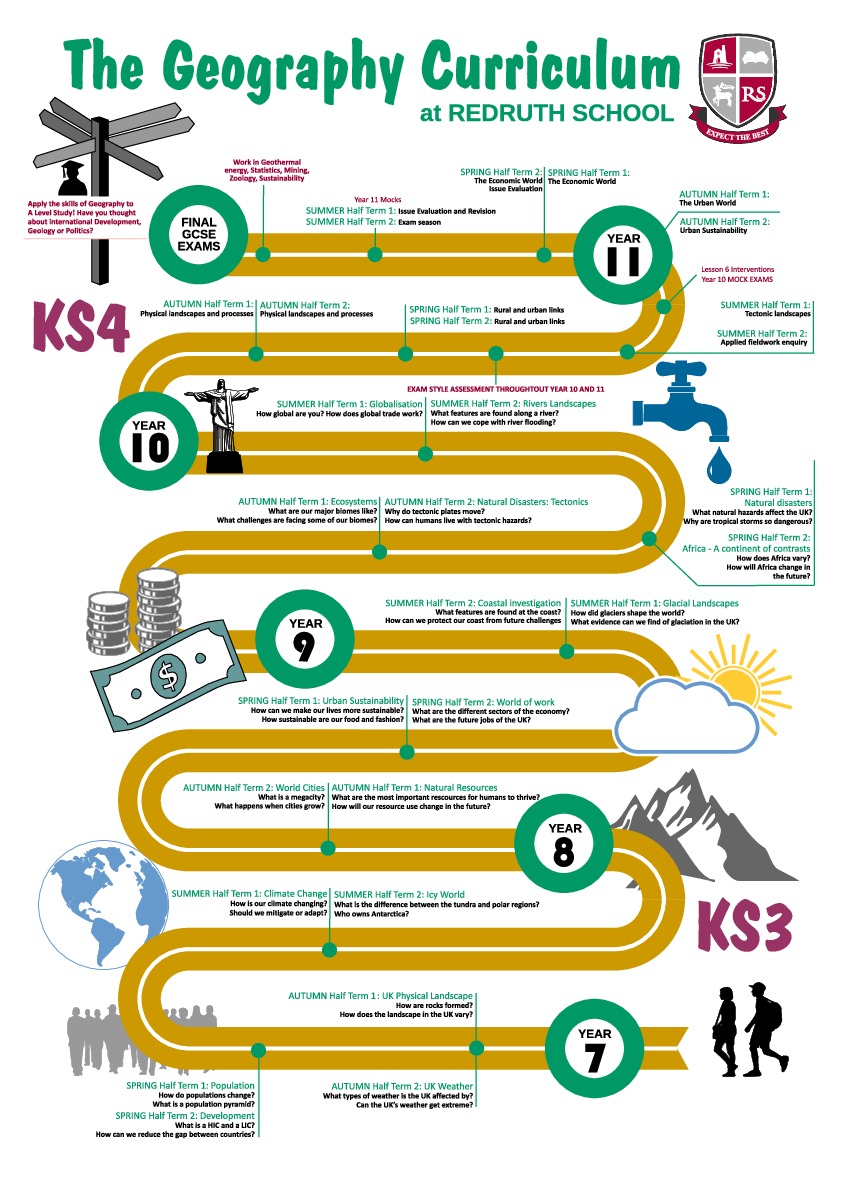- Home
- Students
- Subject Information
- Geography
- facebookShare this page on Facebook
- twitterTweet this page
- pinterestPin this page
Geography
Head of Subject: Miss Amy Sparrow
asparrow@redruth.cornwall.sch.uk
Geography Curriculum Intent
Geography students will become global citizens and build on their respect for differing cultures and perspectives through the curriculum. They are proud to develop their own local sense of place, but also an appreciation of the diversity of our complex and dynamic world by studying national, regional, and global concepts which equips them to participate in issues of all scales.
They will understand physical and human processes and how they interact, engaging with real world issues to help develop a lifelong love of learning. Students experience a high-quality, ambitious curriculum and strive for excellence. This excellence is inclusive, and the high-quality curriculum extends to our enrichment offerings with local fieldwork playing a key role, alongside further national and international opportunities. Geography is a springboard for students' future, setting them up for further study and equipping with skills for whichever career path they chose. Building resilience and a culture of challenge and determination aids our pupils to becoming well-rounded members of the local and global community.

What does the geography Key Stage 3 curriculum look like?
The Key Stage 3 curriculum is designed to build on students Geography knowledge, understanding and skills at a range of scales, starting with our local heritage and building to decision-making on a global scale.
- We view Year 7 as our foundational year, introducing essential human and physical geographical concepts through social, economic and environmental analysis. We start locally studying physical landscapes before exploring the wider UK, and global concepts of development, population and climate change. These important topics are the building blocks of Key Stage 3 and beyond.
- Year 8 begins to explore future geographical challenges and their solutions in the UK and abroad. Students will begin to study natural resources and how cities use them, before looking at the future of urban sustainability and industry. They will investigate UK glacial environments, tourism in Cornwall and beyond.
- Year 9 students investigate global issues, challenge misconceptions and examine the interactions of the human and physical environments. This global approach begins by evaluating world biomes and is designed to provide students with up-to-date worldviews and an ability to think critically about our dynamic world. This will ensure students who pursue geography at Key Stage 4 and beyond will have the knowledge, understanding and skills to be well-rounded global citizens with a deeper understanding of the workings of the human and physical world they live in.
How we asses geography in KS3
Formative assessment is used at half-termly intervals. These assessments are used to inform data points. Formative assessment is used within every lesson to reflect upon prior learning, check prior knowledge and address misconceptions.
What does the geography Key Stage 4 curriculum look like?
The Geography KS4 curriculum is designed to build on the students broad knowledge, understanding and skills from Key Stage 3. Students will study the AQA GCSE Geography Syllabus which is divided into 3 units.
- Living with the Physical Environment involves studying Natural Hazards (including tectonics, weather and climate change), The Living World (including rainforests and deserts) and Coasts and Rivers.
- Challenges in the Human Environment includes studying urban issues and challenges (including UK and global examples), the changing economic world (through global inequality, a study of Nigeria and the UK economy) and the challenge of resource management (managing food, energy and primarily water supplies).
- Paper 3 – Geographical Applications involves Fieldwork and a Decision-Making Exercise, which builds on the synopticity of Geography drawing together key geographical ideas to allow students to problem-solve. Fieldwork is at the heart of geography and students will undertake at least 1 day of compulsory fieldwork during their course. This allows students to understand the enquiry process, become more independent, and develop their wider geographical understanding in a real-world context.
How we asses geography in KS4
Formative assessment is used at half-termly intervals. These assessments, which contain exam questions and past papers, are used to inform data points. Formative assessment is used within every lesson to reflect upon prior learning, check prior knowledge and address misconceptions.
How can you support geography learning at home?
- We are very lucky that we can see geography in the human and physical world around us. If you go out walking with your child or visit places please encourage them to discuss the physical environment and how it has formed and the reasons behind that human environment being there
- There are a huge amount of TV programmes, films and documentaries that support geographical learning. Great programmes can be found on the following like: Wider Watching in Geography - Internet Geography
- Please encourage your child to read around the subject. There are many geography related books in our school library including ‘Horrible Geographies’ and ‘Prisoners of Geography’
- Our AQA GCSE revision guide is available to purchase on Parent Pay and students can use this to support discussions about their learning with you at home.
Key Stage 4 revision resources
Students
- Careers
- Combined Cadet Force
- Duke of Edinburgh's Award
- Extra-Curricular Clubs, Trips & Activities
- Future4 curriculum
- Learning Resource Centre (Library)
- More Able Provision
- Our House System
- Pastoral
- Student Portal & Class Charts
- Subject Information
- Student Voice
- Student Wellbeing
- Work Experience


